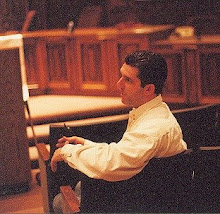Mortgage Rates, Housing Markets, and Why It's Our Turn
Haven’t discussed the market much recently, which is because it’s been trading in the same range for some time, at least as far as the bond goes. For those just joining us, the 10-year treasury bond is the leading indicator for mortgage rates (where “leading indicator” in this case means “absolute predictor”). The bond yield is 5.98%, where we’ve been for a bout three weeks since the market gave up trying to coax any sanity out of the Fed Chair. All economic news is to be interpreted not on its own merits, but according to what the Fed will do with it. Therefore bad economic news is to be ignored and good economic news is a sign that inflation is going to eat us alive. The yield curve, however, is no longer inverted, which over at the Fed Bernanke will take as a sign of correct policy. Unfortunately.
A 10-year yield of 6% means mortgage rates of roughly 6.375% on the 30-year and 6% on the 15-year. The 7-year ARM, interestingly, has for the first time in my career become a serious player in the market, as it is being priced about 1/8 below the 30-year. For most people, 7 years and 30 years are roughly the same, as they don’t intend to be in their houses for even 5 years, let alone 7. So we’re writing some 7-year loans for the first time. One never knows.
On the housing front, no doubt you’ve heard all about the huge real-estate crash that has virtually wiped out Las Vegas and San Diego. You haven’t? Oh, wait….that might be because IT ISN’T HAPPENING, despite pronouncements from everyone on earth that the market is ridiculously overpriced. Without wanting to get too deeply into the reasons that the market cannot get too overpriced (this is assuming that the government does not take “action” to “save the housing market” like they did in the 1980s, which “help” destroyed both the housing market and the entire savings and loan industry of the US), let me nonetheless say that although the vulture media will search for horror stories, the vast majority of people in the US will not have their houses decline in value at all over the next year.
If you happen to live in Utah, not only will your house not fall in value, it will likely rise by some thousands, perhaps as much as 20% this year. More, if you happen to live in one of the hotspots (Midway, for one). Utah, as readers of this column know, has lagged the rest of the country in home appreciation for several years. Well it’s our turn now, baby. The average house bought 2 years ago for $200,000 will appraise between $250 and $275, depending on the area.
If you’re not looking to buy or sell, you really ought to consider a refinance to a loan we describe here. It’s the loan we’re getting on our house. It has the potential to decrease the time to payoff of your mortgage by as much as 14 years without changing your monthly outlays or your spending habits. It is not a biweekly payment system; this is something new. Call us (801-310-3407) or email us and we’ll talk over your situation.


<< Home